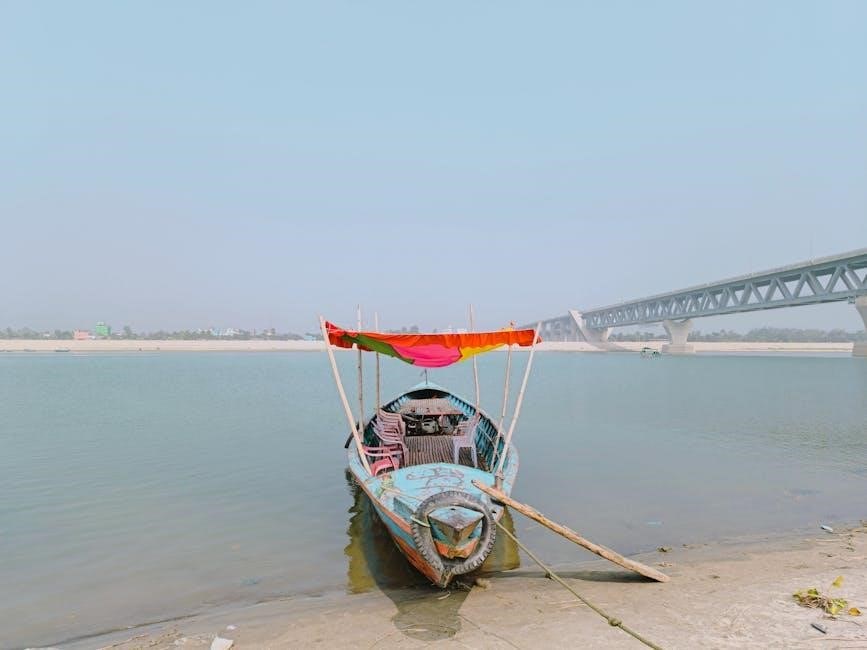odyssey pdf robert fagles
The Odyssey, an ancient Greek epic poem attributed to Homer, recounts Odysseus’ perilous journey home after the Trojan War. Robert Fagles, a renowned translator and scholar, brings this timeless tale to life with his lyrical and accessible translation. His work bridges ancient literature and modern readers, earning widespread acclaim for its fidelity to the original text while maintaining poetic beauty. Fagles’ translation is celebrated for its clarity and emotional depth, making The Odyssey accessible to a broad audience. The PDF version of his translation is a valuable resource for students and enthusiasts alike, offering a comprehensive reading experience.
Overview of “The Odyssey” as an Epic Poem
The Odyssey is an ancient Greek epic poem attributed to Homer, chronicling Odysseus’ ten-year journey home to Ithaca after the Trojan War. Comprising 24 books, the poem explores themes of heroism, loyalty, deception, and destiny. Odysseus faces divine interventions, mythical creatures, and moral dilemmas, testing his wit and resilience. The epic is celebrated for its rich narrative, complex characters, and exploration of human nature. As a foundational work of world literature, The Odyssey remains a timeless tale of adventure and self-discovery, with Robert Fagles’ translation offering a modern yet faithful rendering of the original text, making it accessible to contemporary readers.
Robert Fagles: Background and Contributions to Classical Translations
Robert Fagles was a distinguished scholar and translator, best known for his poetic renderings of ancient Greek and Roman epics. As the Arthur W. Marks Professor of Comparative Literature Emeritus at Princeton University, he dedicated his career to making classical works accessible to modern audiences. Fagles’ translations of The Iliad, The Odyssey, and The Aeneid are celebrated for their lyrical precision and emotional depth. His work earned numerous accolades, including the 1997 PEN/Ralph Manheim Medal for Translation. Fagles’ translations are renowned for balancing fidelity to the original texts with a contemporary, readable style, ensuring the timeless appeal of classical literature.
The Significance of Robert Fagles’ Translation
Robert Fagles’ translation of The Odyssey preserves the epic’s poetic essence while rendering it accessible to modern readers. His work bridges ancient literature and contemporary understanding, ensuring timeless relevance.
The Impact of Fagles’ Translation on Modern Readers
Robert Fagles’ translation of The Odyssey has profoundly impacted modern readers by making Homer’s epic accessible and engaging. His clear, poetic language resonates with contemporary audiences, fostering a deeper connection to the ancient narrative. The PDF version, widely available online, has become a staple in academic and personal libraries, enabling readers to explore Odysseus’ journey with ease. Fagles’ work has inspired new generations to appreciate classical literature, bridging the gap between ancient Greece and today’s readers. His translation is celebrated for its ability to convey the original’s emotional depth and complexity, ensuring its enduring relevance.
Key Features of Fagles’ Translational Style
Robert Fagles’ translation of The Odyssey is distinguished by its lyrical prose, which captures the epic’s poetic essence while maintaining clarity. His use of free verse allows for a natural flow, making the ancient text relatable to modern readers. Fagles emphasizes dramatic tension and emotional depth, preserving the original’s complexity. His language is both evocative and precise, balancing fidelity to Homer’s intent with a contemporary tone. The PDF edition enhances readability, ensuring that Fagles’ masterful translation remains accessible and engaging for scholars and general readers alike, solidifying its place as a definitive interpretation of the classic epic.

The PDF Version of “The Odyssey” by Robert Fagles
The PDF edition of The Odyssey, translated by Robert Fagles, offers a complete and accessible reading experience. It includes the full text, introduction by Bernard Knox, and detailed notes, providing both scholars and readers with a rich resource for understanding Homer’s epic. Available online through various platforms, this digital format ensures convenience and readability, making Fagles’ acclaimed translation easily accessible for study and enjoyment.
Overview of the PDF Edition
The PDF edition of The Odyssey, translated by Robert Fagles, is a Penguin Classics Deluxe Edition (ISBN 978-0-14-026886). It features the complete text of Homer’s epic poem, an introduction by Bernard Knox, and detailed notes for deeper understanding. The digital format ensures accessibility, with clear typography and a well-organized layout. This edition is widely available online, including on platforms like Scribd, and is a popular choice for students and enthusiasts of classical literature; Fagles’ translation is praised for its poetic yet faithful rendering of the original Greek, making the PDF a valuable resource for both academic and personal use.
Where to Find the PDF Online
The PDF of The Odyssey translated by Robert Fagles can be found on various online platforms. Scribd, a popular social reading site, offers the full text for free. Additionally, platforms like PDFy and archive.org host the file, accessible for download. The Penguin Classics Deluxe Edition (ISBN 978-0-14-026886) is widely available on these sites. Users can search using keywords like “The Odyssey Robert Fagles PDF” to locate the file. These platforms provide easy access to the translation, making it convenient for students and enthusiasts to engage with Homer’s epic poem in a digital format.
ISBN and Publication Details
The PDF edition of The Odyssey translated by Robert Fagles is part of the Penguin Classics Deluxe Edition, featuring the ISBN 978-0-14-026886. This edition includes an introduction by Bernard Knox and detailed notes, enhancing the reader’s understanding of Homer’s epic poem. Published by Penguin Books, it is widely recognized for its scholarly accuracy and engaging readability. The translation is celebrated for its poetic flair while remaining faithful to the original Greek text. This edition is a popular choice among students and scholars, offering a comprehensive and accessible reading experience of The Odyssey.
Structure and Content of the PDF
The PDF features an introduction by Bernard Knox, a book-by-book breakdown of Odysseus’ journey, and comprehensive notes. These elements enhance understanding and provide scholarly context.
Bernard Knox’s introduction provides a compelling analysis of Homer’s world, highlighting the cultural and historical context of The Odyssey. Knox explores themes of heroism, fate, and human complexity, offering insights into Odysseus’ character and the poem’s enduring relevance. His scholarly perspective enriches readers’ understanding, bridging ancient and modern interpretations. The introduction is both accessible and erudite, making it an invaluable resource for readers engaging with Fagles’ translation. Knox’s work sets the stage for a deeper appreciation of the epic’s nuances and timeless appeal.
Book-by-Book Breakdown
The PDF edition of The Odyssey translated by Robert Fagles includes a detailed book-by-book breakdown, enabling readers to navigate the epic poem’s structure with ease. Each book is concisely summarized, highlighting key events and themes. This feature helps readers track Odysseus’ journey from his departure in Book I to his triumphant return in Book XXIV. The breakdown also underscores the development of major themes such as loyalty, deception, and destiny, providing a clear roadmap for understanding the narrative’s progression. This organizational tool enhances the reading experience, making Fagles’ translation even more accessible and engaging.
Notes and Commentary
The PDF edition of The Odyssey translated by Robert Fagles includes extensive notes and commentary, enriching the reader’s understanding of the text. These supplementary materials, contributed by scholars like Bernard Knox, provide historical context, cultural insights, and explanations of complex themes. The commentary delves into Homeric language, character motivations, and symbolic elements, offering a deeper appreciation of the epic poem. Readers can explore the nuances of ancient Greek culture and the poetic techniques employed by Homer. These resources make the PDF a valuable tool for both casual readers and academic studies, enhancing the overall reading experience.

Study Guides and Resources
Study guides and resources for The Odyssey include analysis, historical context, and aids for understanding the epic poem. These materials enhance comprehension and deepen engagement with the text.
Available Study Guides for “The Odyssey”
Various study guides are available to accompany The Odyssey, offering in-depth analysis, historical context, and interpretive insights. These guides include summaries, character analyses, and thematic discussions. They often feature essays, discussion questions, and historical background to enhance understanding. Some guides are specifically designed for students, providing structured lesson plans and reading strategies. Additionally, digital resources like PDFs and online databases offer accessible tools for exploring the epic poem. These materials cater to both academic and independent learners, fostering a deeper engagement with Homer’s masterpiece and its timeless themes;
Independent Project Ideas
Engage deeply with The Odyssey by exploring creative and analytical projects. Create a multimedia presentation tracing Odysseus’ journey, incorporating key themes like loyalty and deception. Write a reflective journal from the perspective of a minor character, imagining their experiences. Craft a comparative analysis of Fagles’ translation with another version, highlighting stylistic differences. Develop a dramatic interpretation of a pivotal scene, focusing on dialogue and character dynamics. Alternatively, design a visual map of Odysseus’ travels, linking geographic locations to textual references. These projects foster a richer understanding of Homer’s epic and its enduring relevance in modern contexts.
Primary Sources and Digital Tools
For an immersive study of The Odyssey, utilize primary sources like the Chicago Homer, a searchable database of the original Greek text. The PDF edition of Robert Fagles’ translation offers a reliable and accessible version, complete with introductions and notes. Digital tools such as study guides and online platforms like Scribd provide additional resources for analysis. These materials enhance understanding of Homer’s masterpiece, allowing readers to explore themes, characters, and historical context in depth. They are invaluable for both academic research and personal enrichment, bridging the gap between ancient literature and modern learning.

Robert Fagles’ Legacy
Robert Fagles, a celebrated translator and Princeton professor, left an indelible mark on classical literature. His translations of The Iliad, The Odyssey, and The Aeneid are renowned for their poetic precision and accessibility, earning him the 1997 PEN/Ralph Manheim Medal for Translation. His work continues to inspire scholars and readers, bridging ancient texts with modern audiences.
Awards and Recognition for His Translations
Robert Fagles received the 1997 PEN/Ralph Manheim Medal for Translation, honoring his exceptional work in classical literature. His translations of The Iliad, The Odyssey, and The Aeneid are widely acclaimed for their poetic beauty and faithfulness to the original texts. Fagles’ ability to bridge ancient Greek and Roman works with modern readers earned him a 1996 Academy Award for his contributions to literature. His translations remain foundational for scholars and enthusiasts, ensuring his legacy as a master translator and scholar.
Fagles’ Other Translations: The Iliad and The Aeneid
Robert Fagles’ translations extend beyond The Odyssey to include Homer’s The Iliad and Virgil’s The Aeneid. His rendition of The Iliad captures the epic’s grandeur and emotional depth, while The Aeneid reflects his mastery of Roman literature. These works showcase Fagles’ ability to balance fidelity to the original texts with a modern, lyrical voice. His translations are celebrated for their clarity and poetic resonance, making classical epics accessible to contemporary readers. Fagles’ work on these three foundational texts solidified his reputation as a leading translator of ancient literature, ensuring his legacy as a bridge between antiquity and modernity.
His Role as a Professor at Princeton University
Robert Fagles served as the Arthur W. Marks ’19 Professor of Comparative Literature, Emeritus, at Princeton University. His academic career was marked by a deep commitment to classical literature and its translation. Fagles was known for his engaging teaching style and his ability to connect ancient texts with modern audiences. He often incorporated visual aids, such as maps of the Greek isles, to enrich his lectures and discussions. Fagles’ role at Princeton extended beyond the classroom, as he actively participated in scholarly collaborations and interviews, fostering a vibrant academic community. His legacy at Princeton continues to inspire students and scholars alike, bridging the gap between ancient and contemporary learning.

The Odyssey’s Plot and Themes
The Odyssey recounts Odysseus’ arduous journey home after the Trojan War, exploring themes of loyalty, deception, and destiny. Its rich narrative highlights the triumph of the human spirit.
Odysseus’ Journey Home
Odysseus’ journey home, as depicted in The Odyssey, is an epic tale of perseverance and cunning. After the Trojan War, he faces a decade of trials, battling mythical creatures like the Cyclops and the Sirens, while navigating treacherous seas. His encounters reveal his intelligence and resilience. The whirlpool Charybdis and the sea monster Scylla test his resolve. Meanwhile, his wife, Penelope, endures suitors vying for her hand, symbolizing loyalty. Fagles’ translation vividly captures Odysseus’ emotional depth, from his longing for Ithaca to his final triumph. His journey embodies the human struggle against fate and the quest for home.
Major Themes: Loyalty, Deception, and Destiny
Loyalty is a cornerstone of The Odyssey, exemplified by Penelope’s unwavering devotion to Odysseus despite the suitors’ relentless pursuit. Deception is a recurring motif, as Odysseus employs cunning and disguise to overcome challenges, such as outwitting the Cyclops Polyphemus. Destiny intertwines with human agency, as the gods shape the characters’ fates, yet Odysseus’s resolve and ingenuity often determine his course. Fagles’ translation masterfully captures these themes, conveying the emotional depth and moral complexity that define Homer’s epic. Through these elements, The Odyssey explores universal human struggles and the enduring quest for home and identity.
Key Characters and Their Roles
Odysseus, the cunning king of Ithaca, embodies resilience and intelligence as he navigates his arduous journey home. Penelope, his loyal wife, symbolizes fidelity and cleverness, thwarting suitors with her weaving trick. Telemachus, their son, evolves from a naive youth to a determined ally of his father. Athena, the goddess of wisdom, serves as Odysseus’ protector, aiding him in times of crisis. Poseidon, the sea god, acts as Odysseus’ antagonist, hindering his return. Fagles’ translation vividly portrays these characters, highlighting their roles in shaping the epic’s narrative of homecoming and destiny.

Downloading the PDF
The Odyssey by Robert Fagles is available as a PDF on platforms like Scribd and archive.org. Users can download the file directly or view it online. The PDF includes the full text, introduction by Bernard Knox, and detailed notes, making it a comprehensive resource for readers and scholars. The ISBN for this edition is 978-0-14-026886, ensuring authenticity and quality.
Platforms Offering the PDF
Multiple platforms offer the PDF of The Odyssey translated by Robert Fagles. Scribd, a popular social reading site, provides free access to the PDF. Additionally, platforms like archive.org and online libraries host the file, ensuring its availability. Users can also find it on academic databases and book-sharing websites. The PDF is often shared in its entirety, including the introduction by Bernard Knox and detailed commentary. These platforms cater to students, researchers, and enthusiasts, making Fagles’ translation widely accessible for educational and personal use.
Steps to Download the PDF
To download the PDF of The Odyssey translated by Robert Fagles, visit platforms like Scribd or archive.org. Search for “The Odyssey Robert Fagles PDF” to locate the file. Select the correct version, ensuring it includes the full text, introduction, and notes. Review the file details to confirm its authenticity and completeness. Click the download button and follow the platform’s instructions. Some sites may require free registration or verification. Always ensure downloads are from reputable sources to avoid unauthorized content. This process provides easy access to Fagles’ acclaimed translation for study or personal reading.
Legal and Ethical Considerations
When accessing the PDF of The Odyssey translated by Robert Fagles, it is essential to respect copyright laws and ethical guidelines. Ensure that the source is authorized, such as purchasing from the publisher or accessing through legitimate platforms. Avoid downloading from unauthorized websites, as this infringes on the rights of the author and publisher. Libraries and educational institutions often provide legal access to such materials. By choosing legal sources, you support the creators and maintain the integrity of intellectual property rights. Always verify the legitimacy of the source before proceeding with the download.

Reading and Analyzing the PDF
Engage deeply with Fagles’ translation by reading slowly and reflecting on its poetic language. Pay attention to Homer’s themes and characters, enhanced by Fagles’ vivid rendering. Use the provided notes and introduction to enrich your understanding of the text’s historical and literary context. This approach will help you fully appreciate the epic’s timeless themes and Fagles’ masterful interpretation.
Tips for Engaging with the Text
To fully engage with Fagles’ translation of The Odyssey, start by reading the introduction by Bernard Knox for historical and literary context. As you read, pay attention to Fagles’ vivid language and poetic style, which captures the epic’s original spirit. Use the provided notes and commentary to deepen your understanding of complex themes and characters. Consider reading aloud to appreciate the rhythm and flow of the text. Highlight key passages and jot down questions or insights for further reflection. Discussing the text with others or joining online forums can also enhance your interpretation and connection to the story.
Understanding Homeric Language in Fagles’ Translation
Fagles’ translation masterfully adapts Homeric language for modern readers while preserving its epic essence. He retains key features like invocation of the Muse and episodic structure, ensuring the original’s poetic integrity. Fagles uses contemporary English to make ancient themes relatable, maintaining the dactylic hexameter’s rhythm in a fluid, natural way. His approach balances fidelity and readability, allowing readers to grasp the emotional depth and complexity of Homer’s narrative. By studying Fagles’ choices, readers can appreciate how he bridges the gap between ancient and modern storytelling, making The Odyssey accessible without losing its timeless appeal.
The PDF edition of The Odyssey includes a detailed introduction by Bernard Knox and extensive notes by Robert Fagles, offering valuable context and insights. Readers can enhance their understanding by consulting these resources, which explain historical references, cultural nuances, and poetic devices. The introduction provides a comprehensive overview of the epic’s themes and significance, while the notes clarify complex passages and highlight key motifs. By referencing these sections, readers can deepen their engagement with the text and appreciate Fagles’ translation choices. This collaborative approach ensures a richer, more informed reading experience of Homer’s timeless masterpiece.
Community and Discussions
Online forums and academic communities actively discuss Robert Fagles’ translation of The Odyssey, sharing insights and analyses. Scholars and readers collaborate, fostering deeper understanding and appreciation of Homer’s epic through collective engagement and dialogue.
Online Communities Discussing Fagles’ Translation
Online communities like Reddit, Goodreads, and academic forums actively discuss Robert Fagles’ translation of The Odyssey. These platforms host vibrant debates, analyses, and interpretations of his work. Readers share insights, compare translations, and explore the nuances of Fagles’ lyrical prose. Scholarly discussions often highlight his ability to balance fidelity to the original Greek text with modern readability. Enthusiasts also recommend study resources and share personal experiences with the PDF edition. These digital spaces foster a collaborative environment, enriching the understanding of Fagles’ translation and its significance in classical literature.
Academic Discussions and Reviews
Scholars and critics widely acclaim Robert Fagles’ translation of The Odyssey for its poetic precision and accessibility. Academic reviews highlight his ability to preserve the epic’s original grandeur while rendering it in modern, lyrical English. Fagles’ work is praised for its fidelity to Homer’s intent and its emotional resonance. His translations of The Iliad and The Aeneid have also earned similar acclaim, solidifying his reputation as a master translator; Academic discussions often explore how his translations bridge ancient and contemporary audiences, making classical literature accessible without compromising its depth. Fagles’ contributions have been recognized with prestigious awards, further cementing his legacy in scholarly circles.
Student Experiences with the PDF
Students widely appreciate Robert Fagles’ PDF translation of The Odyssey for its clarity and accessibility. The modern English rendering makes Homer’s epic relatable, while the introduction by Bernard Knox provides essential context. Many find the book-by-book breakdown and notes invaluable for study, offering insights into themes and characters. The PDF’s portability and searchability are praised, enhancing ease of use. Fagles’ lyrical style helps students engage deeply with Odysseus’ journey, fostering a richer understanding of the ancient text. Overall, the PDF is a cherished resource for both academic and personal exploration of The Odyssey.
The Odyssey remains a timeless epic, with Robert Fagles’ translation offering a vibrant bridge to ancient Greece. His work ensures the poem’s enduring relevance, making it accessible to modern readers. The PDF edition is a valuable resource for both study and appreciation, preserving the essence of Homer’s masterpiece while inviting new generations to explore its depths.
The Enduring Relevance of “The Odyssey”
The Odyssey continues to captivate audiences with its universal themes of human struggle, loyalty, and destiny. Its exploration of Odysseus’ journey resonates across centuries, reflecting timeless human experiences. Robert Fagles’ translation breathes new life into Homer’s epic, making it accessible to modern readers while preserving its poetic essence. The PDF edition ensures that this ancient masterpiece remains a vital resource for education and personal exploration, bridging the gap between antiquity and contemporary culture; Its relevance endures, offering insights into heroism, perseverance, and the complexities of human nature.
Fagles’ Translation as a Bridge to the Past
Robert Fagles’ translation of The Odyssey serves as a bridge to the past, connecting modern readers with ancient Greek literature. His masterful rendering preserves the epic’s poetic beauty while making it accessible in contemporary English. Fagles’ work honors Homer’s original intent, capturing the emotional depth and complexity of Odysseus’ journey. The PDF edition ensures that this classic tale remains a vital link to antiquity, allowing readers to engage with timeless themes of heroism, identity, and resilience. Fagles’ scholarship and artistry have created a lasting legacy, making The Odyssey a cornerstone of both classical and modern literary studies.
Final Thoughts on the PDF Edition
The PDF edition of The Odyssey translated by Robert Fagles is an invaluable resource for scholars and enthusiasts alike. Its digital format ensures accessibility and convenience, while the inclusion of Bernard Knox’s introduction and detailed notes enhances comprehension. Fagles’ translation balances fidelity to the original Greek with a fluid, modern style, making the epic poem resonate with readers. The PDF’s clarity and portability allow for seamless reading and analysis, ensuring that Homer’s masterpiece remains relevant in the digital age. This edition is a testament to Fagles’ enduring contribution to classical literature, offering a timeless reading experience.